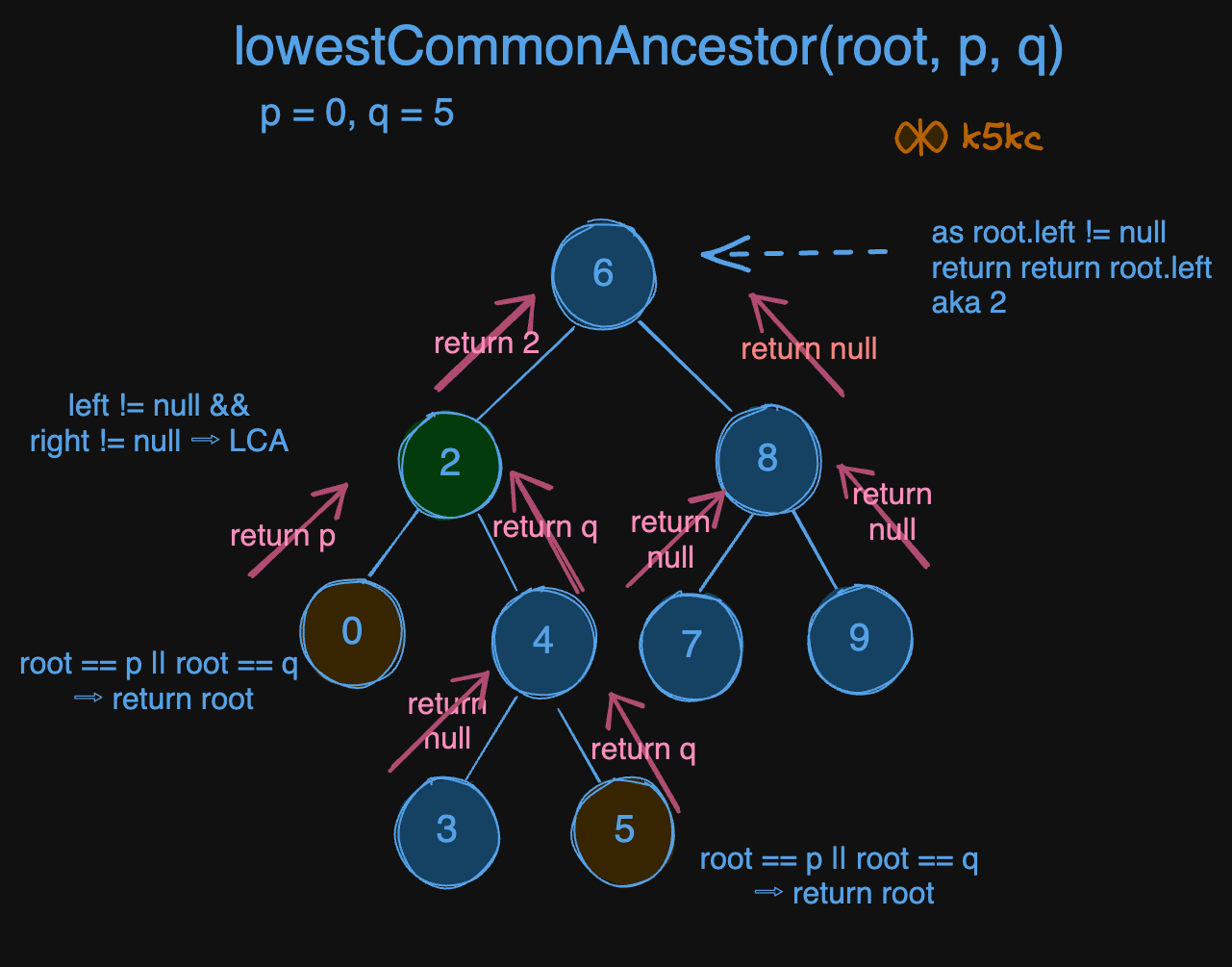Lowest Common Ancestor of a Binary Tree
MediumUpdated: Mar 4, 2025
Practice on:
Problem
Given a binary tree, find the lowest common ancestor (LCA) of two given nodes in the tree.
Definition
[Lowest Common Ancestor Definition](lowest-common-ancestor-definition)
Examples
Example 1:
graph TD; 6:::lcaNode --- 2:::nodeToFind & 8:::nodeToFind 2 --- 0 & 4 8 --- 7 & 9 4 --- 3 & 5 classDef nodeToFind fill:#FF9933,stroke-width:4px; classDef lcaNode fill:#3399FF,stroke-width:4px;
Input: root = [6,2,8,0,4,7,9,null,null,3,5], p = 2, q = 8
Output: 6
Explanation: The LCA of nodes 2 and 8 is 6.
Example 2:
graph TD; 6; 6 --- 2:::lcaNode & 8 2 --- 0:::nodeToFind & 4 8 --- 7 & 9 4 --- 3 & 5:::nodeToFind classDef nodeToFind fill:#FF9933,stroke-width:4px; classDef lcaNode fill:#3399FF,stroke-width:4px;
Input: root = [6,2,8,0,4,7,9,null,null,3,5], p = 0, q = 5
Output: 2
Explanation: The LCA of nodes 0 and 5 is 2.
Example 3:
graph TD; 6; 6 --- 2:::lcaNode & 8 2 --- 0 & 4:::nodeToFind 8 --- 7 & 9 4 --- 3 & 5 classDef nodeToFind fill:#FF9933,stroke-width:4px; classDef lcaNode fill:#3399FF,stroke-width:4px;
Input: root = [6,2,8,0,4,7,9,null,null,3,5], p = 2, q = 4
Output: 2
Explanation: The LCA of nodes 2 and 4 is 2, since a node can be a descendant of itself according to the LCA definition.
Note
- You are given 2 values. Find the lowest common ancestor of the two nodes represented by
val1andval2. - No guarantee that
val1andval2exist in the tree. If one value doesn’t exist in the tree then return -1. - There are no duplicate values.
- You can use extra memory, helper functions, and can modify the node struct but, you can’t add a parent pointer.
Follow up
What if nodes don't exist in the tree?
Refer [Lowest Common Ancestor of a Binary Tree 2 - Nodes may not exist in Tree](lowest-common-ancestor-of-a-binary-tree-2-nodes-may-not-exist-in-tree).
Solution
Video explanation
Here is the video explaining below methods in detail. Please check it out:
<div class="youtube-embed"><iframe src="https://www.youtube.com/embed/za1zNyS5aFo" frameborder="0" allowfullscreen></iframe></div>
Method 1 - By Storing root to p and q paths using backtracking
Algorithm
- Find path from root to p and store it in list.
- Find path from root to q and store it in list.
- Traverse both paths till the values in arrays are same, and return the common node just before the mismatch.
Code
Java
public class Solution {
private TreeNode root;
private List<TreeNode> path1 = new ArrayList<>();
private List<TreeNode> path2 = new ArrayList<>();
public TreeNode lowestCommonAncestor(int p, int q) {
path1.clear();
path2.clear();
return helper(root, p, q);
}
private TreeNode helper(TreeNode root, int p, int q) {
if (!createPathIfExists(root, p, path1) || !createPathIfExists(root, q, path2)) {
return null; // If either p or q is not present.
}
int i;
for (i = 0; i < path1.size() && i < path2.size(); i++) {
if (!path1.get(i).equals(path2.get(i))) {
break;
}
}
return path1.get(i - 1); // Return the lowest common ancestor.
}
private boolean createPathIfExists(TreeNode root, int child, List<TreeNode> path) {
if (root == null) {
return false;
}
path.add(root);
if (root.val == child) {
return true;
}
if (createPathIfExists(root.left, child, path) || createPathIfExists(root.right, child, path)) {
return true;
}
path.remove(path.size() - 1); // Backtrack if child is not found in this path.
return false;
}
public static class TreeNode {
int val;
TreeNode left, right;
TreeNode(int x) {
val = x;
}
}
}
Python
class TreeNode:
def __init__(self, x: int):
self.val = x
self.left: Optional['TreeNode'] = None
self.right: Optional['TreeNode'] = None
class Solution:
def __init__(self):
self.root: Optional[TreeNode] = None
self.path1: List[TreeNode] = []
self.path2: List[TreeNode] = []
def lowestCommonAncestor(self, root: Optional[TreeNode], p: int, q: int) -> Optional[TreeNode]:
self.path1.clear()
self.path2.clear()
if not self.createPathIfExists(root, p, self.path1) or not self.createPathIfExists(root, q, self.path2):
return None # If either p or q is not present.
i = 0
while i < len(self.path1) and i < len(self.path2):
if self.path1[i] != self.path2[i]:
break
i += 1
return self.path1[i - 1] if i > 0 else None # Return the lowest common ancestor.
def createPathIfExists(self, root: Optional[TreeNode], child: int, path: List[TreeNode]) -> bool:
if not root:
return False
path.append(root)
if root.val == child:
return True
if self.createPathIfExists(root.left, child, path) or self.createPathIfExists(root.right, child, path):
return True
path.pop() # Backtrack if child is not found in this path.
return False
Complexity
- ⏰ Time complexity:
O(n). The tree is traversed twice, and paths are compared. - 🧺 Space complexity:
O(n)
Method 2 - Using Post-order Traversal 🏆
We can follow the approach:
- Base Cases:
- If the current node is
null, returnnull. - If the current node is one of the nodes (
porq), return the current node.
- If the current node is
- Recursive Search:
- Traverse the left subtree to search for
pandq. - Traverse the right subtree to search for
pandq.
- Traverse the left subtree to search for
- Determine LCA:
- If both left and right subtrees return non-null values, it means
pandqare found on both sides, and the current node is their LCA. - If only one of the subtrees returns a non-null value, propagate that value upwards.
- If both left and right subtrees return non-null values, it means
Picture for better explanation

Code
Java
public class Solution {
public TreeNode lowestCommonAncestor(TreeNode root, TreeNode p, TreeNode q) {
if (root == null || root == p || root == q) {
return root;
}
TreeNode left = lowestCommonAncestor(root.left, p, q);
TreeNode right = lowestCommonAncestor(root.right, p, q);
if (left != null && right != null) {
return root;
}
return left != null ? left : right;
}
}
Python
class Solution:
def lowestCommonAncestor(self, root: Optional['TreeNode'], p: 'TreeNode', q: 'TreeNode') -> Optional['TreeNode']:
if not root or root == p or root == q:
return root
left: Optional['TreeNode'] = self.lowestCommonAncestor(root.left, p, q)
right: Optional['TreeNode'] = self.lowestCommonAncestor(root.right, p, q)
if left and right:
return root
return left if left else right
Complexity
- ⏰ Time complexity:
O(n), wherenis number of nodes in tree, as we traverse the whole tree - 🧺 Space complexity:
O(h)(assuming recursion tree)
Method 3 - Using RMQ
#TODO later.